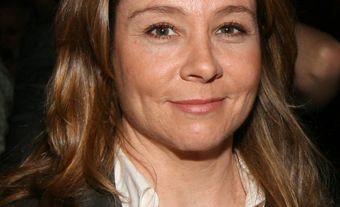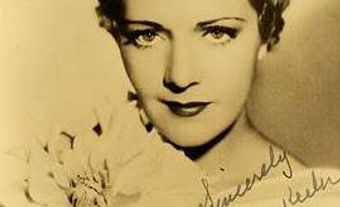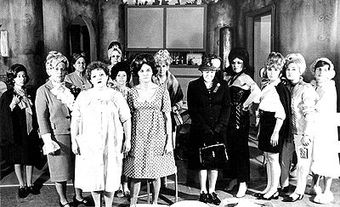Anne-Marie Cadieux
Anne-Marie Cadieux, actor (b at Montréal Sep 23 1963). After earning a BA in theatre from the University of Ottawa, Anne-Marie Cadieux first appeared on stage in 1983 in Les Belles-Sœurs, directed by André Brassard (NAC/NCT). He directed her again in André Ricard's L'Année de la grosse tempête (NAC, 1984), then in Genet's Les Bonnes (NAC, 1985).
In 1990, Anne-Marie Cadieux had two determining encounters: Brigitte Haentjens, entrusted her with the role of the she-wolf in Soirée bénéfice pour ceux qui ne seront pas là en l'an 2000 by Michel Marc Bouchard (NAC workshop); and Robert Lepage, made her his Lady Capulet in Roméo et Juliette (Nightcap Productions). She established long and productive partnerships with these two directors. First, with Lepage, she would perform the Shakespearian trilogy (Macbeth, Coriolan, The Tempest, 1992-93), presented on an international tour, as would be Les Sept Branches de la rivière Ota (1994-97). Then, she became somewhat of a favourite of Brigitte Haentjens, beginning with Heiner Müller's Quartett (Espace Go, 1996). In this merciless pas de deux with Marc Béland, astonished spectators discover her exceptional moral strength. Then followed Bernard-Marie Koltès' Combat de nègre et de chiens (Théâtre Nouveau Monde, 1997); Dacia Maraini's Marie Stuart (TNM, 1999; prix Gascon-Roux for best performer); and successively Électre, Malina and Mademoiselle Julie (Espace Go, 2000). Anne-Marie Cadieux worked moreover, with directors Martine Beaulne (Roméo et Juliette, TNM, 1999); Lorraine Pintal (L'Hiver de force, TNM, 2001, Théâtre de l'Odéon, Paris, 2002); and Serge Denoncourt (Gertrude (le Cri)/Gertrude the Cry, Espace Go, 2005). Shamelessly, she placed herself in situations of extreme vulnerability, portraying raw unsteady characters, on the edge, sometimes literally laying herself bare to display sufferings of the soul through her body. But Haentjens also exploited the actor's comic talent in Feydeau's les Farces conjugales (Théâtre du Rideau Vert, 2003).
Anne-Marie Cadieux is also seen in a lighter register on television (Cover Girl) and in films: Charles Binamé's Le Cœur au poing (1997; prix Jutra, supporting actress, 1999); Sébastien Rose's Comment ma mère accoucha de moi pendant sa menopause/How my Mother Gave Birth to me during menopause (2001) François Bouvier's Maman Last Call (2004). Robert Lepage also coached her Feydeau-style in Nô where she played a vaudeville actor. Furthermore, it is to him that Anne-Marie Cadieux owes her first role on the big screen: that of Manon, the naked dancer in La Confessionnal/The Confessional (1994; prix Luce-Guilbeault, revelation of the year). After La Face cachée de la lune/The Far Side of the Moon (2002) again with Robert Lepage, she burst onto the screen as the amateur film buff who tracks down the happiness of passers-by in François Delisle's Le bonheur est une chanson triste/Happiness is a Sad Song (2003).
Anne-Marie Cadieux wrote La Nuit (Théâtre de la Vieille 17), which she also directed and performed in, a black work that offers a disturbing picture of possible links with violence. This show sent shock waves through the Carrefour international de théâtre in Québec in 1994, then at the FTA the following year, before being presented in Brussels in 1995.

 Share on Facebook
Share on Facebook Share on X
Share on X Share by Email
Share by Email Share on Google Classroom
Share on Google Classroom


